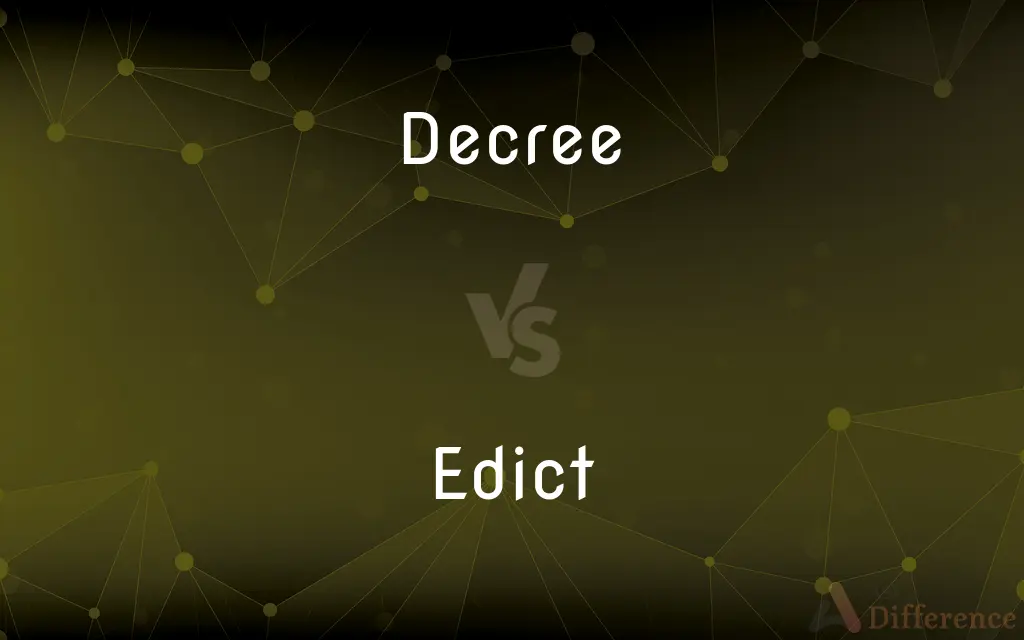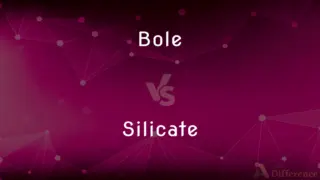Decree vs. Edict — What's the Difference?
By Tayyaba Rehman & Maham Liaqat — Updated on April 7, 2024
A decree is a formal and authoritative order, often issued by a legal authority, whereas an edict is a proclamation or command issued by a high authority, not limited to legal contexts.

Difference Between Decree and Edict
Table of Contents
ADVERTISEMENT
Key Differences
A decree typically refers to an official order issued by a legal authority, often having the force of law behind it. It is commonly used within the context of judicial or governmental decisions, embodying a specific directive or decision that must be followed. On the other hand, an edict is a broader term that refers to any authoritative proclamation or command. While it can also carry legal weight, edicts are often associated with sovereign or executive powers and can cover a wider range of directives, from administrative policies to public announcements.
Decrees often originate from a court or a government body and have a specific legal context. They can enact, change, or confirm legal statuses, and their application is primarily within the judicial and administrative frameworks. Edicts, however, can be issued by any authority holding power, including monarchs, religious leaders, and government officials, and they may not always have a legal framework. The scope of an edict can range from the declaration of a new law to instructions on governance or public behavior.
The issuance of a decree is typically the result of a deliberative process, including legal reasoning, consultation, and adherence to existing laws or regulations. This process ensures that decrees are not arbitrary and are grounded in legal principles. Conversely, edicts can be issued unilaterally and may reflect the will or the directive of the issuer more than a collective decision-making process. This distinction highlights the potential for edicts to be more personal or idiosyncratic in nature.
The enforceability of decrees is often clear, as they are supported by the legal system and include mechanisms for enforcement. Failure to comply with a decree can result in legal consequences, including penalties or other judicial actions. While edicts can also be enforceable, the basis of their enforcement might stem from the authority of the issuer rather than a structured legal framework. The consequences for non-compliance can vary widely depending on the nature of the edict and the context in which it is issued.
Both decrees and edicts serve important functions in governance and the exercise of authority. Decrees are vital for the orderly conduct of legal and administrative affairs, ensuring decisions are made transparently and are based on law. Edicts, while sometimes overlapping with decrees in function, offer a means for leaders to communicate directly with their subjects or citizens, issuing commands and guidelines that may reflect immediate needs or policies.
ADVERTISEMENT
Comparison Chart
Origin
Legal authority (e.g., courts, government bodies)
High authority (e.g., monarchs, religious leaders)
Legal Framework
Specific legal contexts
Can be outside legal frameworks
Issuance Process
Deliberative process, grounded in legal principles
Can be unilateral, reflecting the issuer's will
Enforceability
Supported by the legal system, clear mechanisms
Can vary, based on the authority of the issuer
Function
Enacts, changes, or confirms legal statuses
Broad, from new laws to administrative policies
Compare with Definitions
Decree
A directive issued by a government or its agencies.
The decree on public health measures was widely publicized.
Edict
A rule or command given by an authority, not always rooted in law.
The company's edict on remote work options was well received by employees.
Decree
An official decision issued by a legal authority.
The government's decree on environmental protection was effective immediately.
Edict
An authoritative announcement that affects public behavior or policy.
The edict banning plastic bags was a step towards environmental sustainability.
Decree
A binding decision made by a court or tribunal.
The divorce decree was issued after months of deliberation.
Edict
A proclamation issued by someone in authority, with or without legal force.
The emperor's edict declared the start of a new festival.
Decree
A formal and authoritative order, especially one having the force of law.
The judge's decree finalized the adoption process.
Edict
An official order or command that is publicly announced.
The mayor's edict on water conservation was issued during the drought.
Decree
An order that has legal validity within the jurisdiction it is issued.
The local council's decree on noise control was strictly enforced.
Edict
A directive from a high authority, often related to governance or policy.
The religious leader's edict on fasting was followed by the community.
Decree
A decree is a rule of law usually issued by a head of state (such as the president of a republic or a monarch), according to certain procedures (usually established in a constitution). It has the force of law.
Edict
An edict is a decree or announcement of a law, often associated with monarchism, but it can be under any official authority. Synonyms include "dictum" and "pronouncement".
Decree
An authoritative order having the force of law.
Edict
A decree or proclamation issued by an authority and having the force of law.
Decree
The judgment of a court of equity.
Edict
A formal pronouncement or command.
Decree
The judgment of a court.
Edict
A proclamation of law or other authoritative command.
Decree
A doctrinal or disciplinary act of an ecclesiastical authority.
Edict
A public command or ordinance by the sovereign power; the proclamation of a law made by an absolute authority, as if by the very act of announcement; a decree; as, the edicts of the Roman emperors; the edicts of the French monarch.
It stands as an edict in destiny.
Decree
An administrative act applying or interpreting articles of canon law.
Edict
A formal or authoritative proclamation
Decree
To order, establish, or decide by decree
Decreed that the two kingdoms would be united.
Edict
A legally binding command or decision entered on the court record (as if issued by a court or judge);
A friend in New Mexico said that the order caused no trouble out there
Decree
To issue a decree.
Decree
An edict or law.
Decree
(legal) The judicial decision in a litigated cause rendered by a court of equity.
Decree
(legal) The determination of a cause in a court of admiralty or court of probate.
Decree
(religion) A predetermination made by God; an act of providence.
Decree
To command by a decree.
A court decrees a restoration of property.
Decree
An order from one having authority, deciding what is to be done by a subordinate; also, a determination by one having power, deciding what is to be done or to take place; edict, law; authoritative ru decision.
There went out a decree from Cæsar Augustus that all the world should be taxed.
Poor hand, why quiverest thou at this decree?
Decree
A decision, order, or sentence, given in a cause by a court of equity or admiralty.
Decree
An edict or law made by a council for regulating any business within their jurisdiction; as, the decrees of ecclesiastical councils.
Decree
To determine judicially by authority, or by decree; to constitute by edict; to appoint by decree or law; to determine; to order; to ordain; as, a court decrees a restoration of property.
Thou shalt also decree a thing, and it shall be established unto thee.
Decree
To ordain by fate.
Decree
To make decrees; - used absolutely.
Father eternal! thine is to decree;Mine, both in heaven and earth to do thy will.
Decree
A legally binding command or decision entered on the court record (as if issued by a court or judge);
A friend in New Mexico said that the order caused no trouble out there
Decree
Issue a decree;
The King only can decree
Common Curiosities
What distinguishes a decree from an edict?
A decree is a specific legal directive issued by a court or government, while an edict is a broader command or announcement that can come from any authority.
Who typically issues decrees?
Decrees are usually issued by legal or governmental authorities within their jurisdiction.
Do edicts require a legal basis?
Not always; their authority can stem from the power or influence of the issuer rather than a structured legal framework.
Is compliance with an edict mandatory?
Compliance can be mandatory if the edict carries legal force or comes from an authority with power to enforce it, though this varies by context.
Can a decree be overturned?
Yes, through legal appeals or changes in law, depending on the jurisdiction and context.
Can an edict be issued by a non-governmental authority?
Yes, edicts can be issued by any high authority, including religious leaders or monarchs, not just governmental officials.
Can a decree have the same impact as an edict?
Yes, both can have significant impacts, but decrees are specifically legal and often more formally integrated into a legal system.
How are decrees enforced?
Through the legal system, with mechanisms for enforcement and penalties for non-compliance clearly defined.
What role do edicts play in governance?
They allow leaders to directly communicate policies, commands, or guidelines, sometimes reflecting immediate needs or changes.
How does the public typically receive decrees and edicts?
Reception can vary widely based on the content, the authority issuing them, and their impact on the public's rights or duties.
Share Your Discovery

Previous Comparison
Sip vs. Take
Next Comparison
Bole vs. SilicateAuthor Spotlight
Written by
Tayyaba RehmanTayyaba Rehman is a distinguished writer, currently serving as a primary contributor to askdifference.com. As a researcher in semantics and etymology, Tayyaba's passion for the complexity of languages and their distinctions has found a perfect home on the platform. Tayyaba delves into the intricacies of language, distinguishing between commonly confused words and phrases, thereby providing clarity for readers worldwide.
Co-written by
Maham Liaqat














































